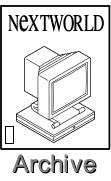 |  |  |  |  |  |  |
| | | | |

|

|
|
| |
October 1991 |
|
 |
|

|
 |
NeXT Ink
by Dan Lavin
The spinners
Spin control. The recent formation of a new software company, unnamed at this writing, to publish WriteNow and possibly other unbundled NeXT software, as well as software from other developers, raises some interesting questions.
The first issue to get out of the way is NeXT's interest in the venture. The mother company is doing a lot of hand-wringing to avoid any mention of the C word (Claris). There is a key difference: Unlike Claris, Apple's software subsidiary, which is wholly owned by Apple, NeXT has no financial interest in the company.
But there are also some similarities. The company involves former NeXT employees and has a clearly preferential relationship, regardless of NeXT's protestations to the contrary. It is not as if the WriteNow account went out for open bid.
Ultimately, it does not really matter what the stock certificates read. It matters what the company will do. I am more than willing to believe that the company will operate as an independent software company, and I think that NeXT will be highly scrupulous about the relationship, but I also think that a taint will always exist. Non-favored software developers are certain to complain about unfair competition.
Spin cycle. Despite all that, the company will clearly be a positive force in the NeXT community. First, it is going to commercialize WriteNow, which will provide real competition in the word-processing category while also establishing a level playing field for the competitors. Sentimentally, I might mourn the passing of free WriteNow, but it is more important that there are be multiple commercial products in major software categories.
The company also will be a good thing for the community if it brings some of NeXT's internal applications to market. NeXT has some fantastic applications that it uses to run the company and create the product. The only thing standing in the way of the rest of us using these products has been the enormous expenditure of resource needed to commercialize them. An outside company will be able to move far more nimbly than NeXT ever could.
The company says it also intends to publish the work of small developers. The community has a lot of small guys creating great software, but they lack the resources to market, manufacture, and sell commercial products. Since the NeXT market seems risky to the outside world, these developers might have trouble getting represented by a traditional software publisher. With the new company's special relationship to NeXT, programs that are needed by the community but not necessarily commercial gangbusters have a chance to reach the market.
Finally, it will also write software of its own, focusing on major productivity software categories, where NeXT clearly needs more support. However, there may be a problem in this area.
Spin down. The new company is driven by devotion to a platform, not a set of customer problems. It will tend to select problems to solve based on holes in the market, not out of enthusiasm for a particular product. This has proven to be an unsuccessful tack in the past and is exactly why Claris has failed to dominate its market.
According to Jeff Tartar, publisher of SoftLetter, "The secret to building successful software companies is passion for products or problems, not passion for platforms. Real software entrepreneurs start by having insights into real customer problems. They don't start companies to exploit markets."
To sidestep this problem, I suggest that the new company avoid the mainstream applications. Instead, it should focus on encouraging small developers and publishing the applications streaming out of NeXT. As for internal development, what it should do is hire people with dreams, empower them, and let them run with them.
See, a whole column without saying spin-off! NeXT should be happy.
|
|